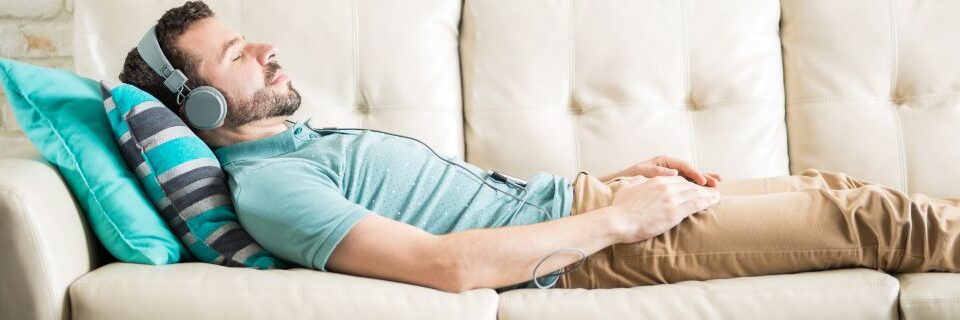
Positive Transformation with Self-Hypnosis for Anxiety and Depression

How Hypnosis to Quit Smoking Can Help You Succeed
Table of Contents
Sleep is essential for good health, which is why we spend about a third of our lives asleep. When we are asleep, our bodies and brains perform critical functions that keep us operating smoothly during our waking hours. A lack of sleep affects your ability to process and remember information and can increase your risk of a variety of health issues, including prediabetes, high blood pressure, and depression. It can also leave you more prone to accidents. UpNow’s sleep hypnosis downloads can help you get the sleep you need without drugs, side effects, or lingering drowsiness.
What is Sleep Hypnosis?
You might be familiar with the idea of hypnosis from pop culture representations, which often make hypnosis appear as something that will make you cluck like a chicken or bark like a dog. In reality, hypnosis is a legitimate medical therapy that has been recognized by major medical organizations such as the British Medical Association and the American Medical Association since the middle of the last century as a treatment for a wide range of issues.
Hypnosis focuses and concentrates your attention. While the process is deeply relaxing, this characteristic is not necessarily solely responsible for its sleep-related benefits. Researchers studying sleep hypnosis evaluated 70 healthy young women in a sleep laboratory to better understand how hypnosis works in the brain. The women listened to either a 13-minute self-hypnosis audio for sleep or a neutral text. They then took a nap while researchers measured their brain waves using an EEG.
The women who used the self-hypnosis audio for sleep spent about 80 percent more time in slow-wave sleep than the women who listened to the neutral text, and they also fell asleep about one-third faster. Slow-wave sleep, also called SWS, is a critical phase of sleep. During SWS, our bodies consolidate memories, repair cells, secrete growth hormones, regulate glucose, and restore energy.
In other words, sleep hypnosis downloads can help you fall asleep faster and get higher quality sleep. Hypnosis for sleep can also help you address existing sleep problems, ranging from sleep anxiety to insomnia.

What to Expect from a Sleep Hypnosis App
Inadequate sleep is a global problem affecting people of all ages and from all walks of life. Studies reveal that between 20 and 43 percent of adults struggle with disturbed sleep. The prevalence of poor sleep is even higher in some groups. While you might not be able to account for all the disruptions to your life, you can take steps to improve your sleep habits. Sleep hypnosis can also give you another tool to transform your sleep.
UpNow’s sleep hypnosis downloads can offer you powerful relief from a variety of sleep issues, including:
- Insomnia
- Sleep anxiety
- Sleepwalking
- Night terrors
- Epic dreaming
- Other parasomnias
Our sleep hypnosis app can be used alone or in conjunction with other therapies, such as cognitive-behavioral therapy or improved sleep hygiene. When using hypnosis for sleep, you will learn to relax and change the way you think about sleep. You may also learn to reframe issues and develop healthier mindsets and coping mechanisms. Targeted suggestions will help you learn to relax more effectively at night, calming your mind and body in preparation for sleep. To get the most out of your self-hypnosis audio for sleep, you may also benefit from addressing other sleep hygiene issues, such as reducing caffeine intake at bedtime or avoiding electronic devices in your bedroom.
Visit UpNow.com today to learn more about sleep hypnosis or download our sleep hypnosis app.
UpNow Health only uses high-quality sources, including peer-reviewed articles, to support the facts within our articles. All our articles are reviewed by experts to ensure that our content is accurate, helpful, and trustworthy.
1. Cordi, M. J., Schlarb, A. A., & Rasch, B. (2014). Deepening sleep by hypnotic suggestion. Sleep, 37(6), 1143–1152F. https://doi.org/10.5665/sleep.3778
2. University of Zurich. (2014, June 2). Hypnosis extends restorative slow-wave sleep, research shows. ScienceDaily. Retrieved December 16, 2021 from www.sciencedaily.com/releases/2014/06/140602101207.htm
3. The Characteristics of Sleep. Division of Sleep Medicine at Harvard Medical. School. http://healthysleep.med.harvard.edu/healthy/science/what/characteristics
4. Chattu, V. K., Manzar, M. D., Kumary, S., Burman, D., Spence, D. W., & Pandi-Perumal, S. R. (2018). The Global Problem of Insufficient Sleep and Its Serious Public Health Implications. Healthcare (Basel, Switzerland), 7(1), 1. https://doi.org/10.3390/healthcare7010001
5. Chamine, I., Atchley, R., & Oken, B. S. (2018). Hypnosis Intervention Effects on Sleep Outcomes: A Systematic Review. Journal of clinical sleep medicine : JCSM : official publication of the American Academy of Sleep Medicine, 14(2), 271–283. https://doi.org/10.5664/jcsm.6952
6. Hauri, P. J., Silber, M. H., & Boeve, B. F. (2007). The treatment of parasomnias with hypnosis: a 5-year follow-up study. Journal of clinical sleep medicine : JCSM : official publication of the American Academy of Sleep Medicine, 3(4), 369–373. https://www.ncbi.nlm.nih.gov/pmc/articles/PMC1978312/











